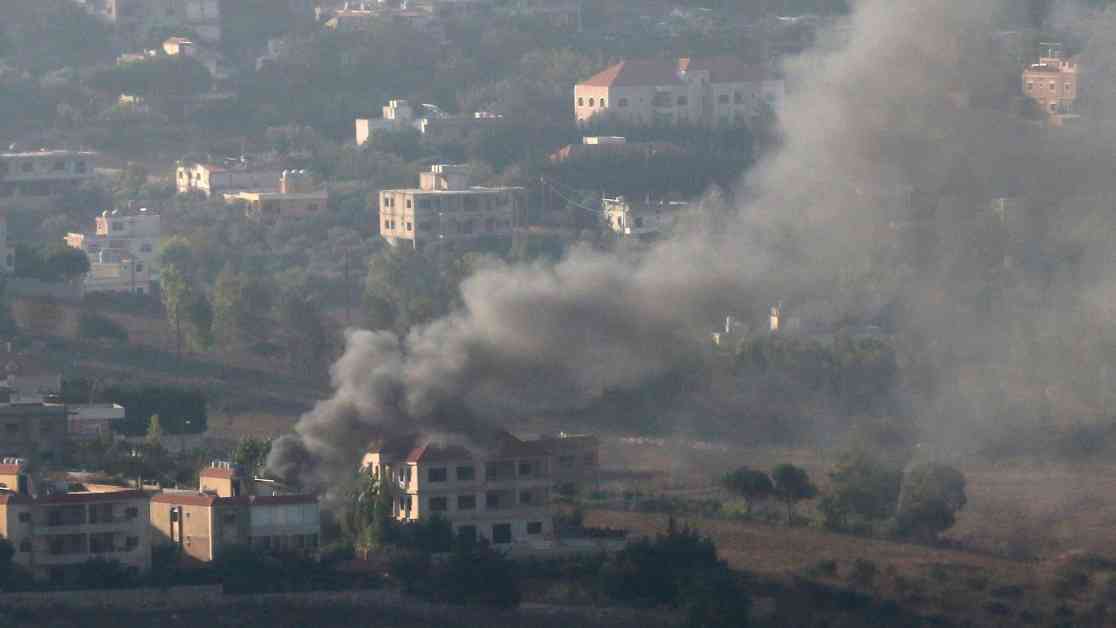Israel Launches Pre-Emptive Airstrikes in Lebanon; Hezbollah Strikes Back
In a recent turn of events, Israel has initiated a series of “pre-emptive” airstrikes in southern Lebanon against Hezbollah. The militant group, in response, has fired drones and hundreds of rockets towards Israel. The escalation in hostilities comes following the killing of one of Hezbollah’s founders and top commanders in an Israeli airstrike in Beirut last month.
**Israel’s Pre-Emptive Strikes**
Israel’s military launched the pre-emptive strikes in response to what they perceived as Hezbollah’s preparations to attack. Israeli military spokesman Rear Admiral Daniel Hagari stated that the strikes were necessary to protect Israel from potential harm. Prime Minister Benjamin Netanyahu affirmed the IDF’s actions, emphasizing the country’s commitment to defending itself against threats.
The attacks prompted warning sirens in northern Israel, with the Iron Dome aerial defense system intercepting missiles from southern Lebanon. The full extent of casualties and damage from the airstrikes is yet to be determined. According to the Associated Press, at least three people were killed in Lebanon as a result of the strikes.
In light of the escalating tensions, flights to and from Tel Aviv’s Ben Gurion airport were temporarily suspended. The Israel Defence Forces (IDF) raised the alert level in northern Israel, urging residents to stay close to bomb shelters as a precautionary measure.
**Hezbollah’s Response and Counterattacks**
Hezbollah swiftly responded to Israel’s airstrikes by launching drones and rockets towards Israeli military positions. The group claimed to have targeted 11 Israeli military sites, bases, and barracks in its initial wave of attacks. Hezbollah’s actions were framed as retaliation for the killing of their senior commander, Fuad Shukr, in the previous Israeli airstrike in Beirut.
Hezbollah, an Iran-backed organization designated as a terrorist group by several countries, including the UK, vowed to continue its attacks as part of what they termed the “first phase” of their response. The group’s leader, Sayyed Hassan Nasrallah, is expected to address the latest developments in a televised speech.
Lebanon’s Health Ministry reported casualties from the strikes, with two individuals killed and others injured. Additionally, the attacks caused severe damage to property, crops, and infrastructure, including electricity and water networks. The situation remains volatile as both sides brace for potential further escalations.
**International Reactions and Concerns**
The unfolding events in the Israel-Lebanon conflict have drawn attention and concern from the international community. The United States, closely monitoring the situation, reaffirmed its commitment to Israel’s defense against any attacks orchestrated by Iran and its proxies. President Joe Biden is closely following the developments, with US defense secretary Lloyd Austin maintaining communication with Israeli officials.
The current escalation in hostilities poses a significant threat to regional stability. Analysts warn of the potential for a wider conflict reminiscent of the 2006 war between Hezbollah and Israel. The specter of past confrontations looms large, raising questions about the efficacy of diplomatic efforts in de-escalating the situation.
**Potential for Ceasefire and Diplomatic Solutions**
Amid the escalating violence, efforts towards achieving a ceasefire in Gaza continue. Talks hosted by Egypt aim to address the ongoing conflict between Israel and Hamas. However, the recent developments in Lebanon have added a layer of complexity to the regional dynamics.
Hezbollah has expressed willingness to halt its attacks if a ceasefire in Gaza is established. The interconnected nature of conflicts in the region underscores the need for comprehensive diplomatic solutions to prevent further bloodshed and instability.
As the situation evolves, the international community remains vigilant, urging restraint and dialogue to avert a full-scale regional conflagration. The delicate balance of power and the intricate web of alliances in the Middle East underscore the urgency of finding peaceful resolutions to longstanding conflicts.
**Conclusion**
The recent pre-emptive airstrikes by Israel in Lebanon and Hezbollah’s retaliatory counterattacks have heightened tensions in the region. The unfolding events underscore the fragile nature of peace in the Middle East and the urgent need for diplomatic efforts to de-escalate conflicts and prevent further violence. As the situation continues to evolve, the international community must remain engaged in promoting dialogue and seeking lasting solutions to ensure stability and security for all parties involved.












